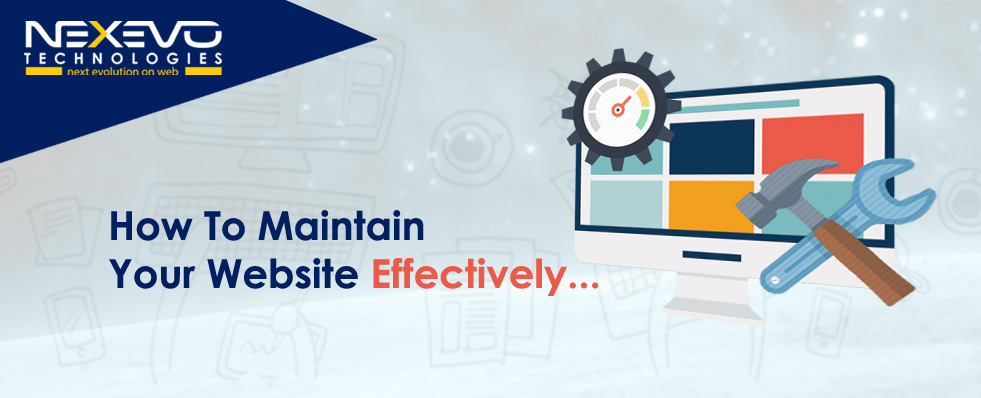The Comprehensive Guide to Website Maintenance and Why It’s So Essential for Your Business

Overview:
In today's digital era, having a well-maintained website is crucial for businesses and individuals alike. Website maintenance refers to the process of regularly updating, optimizing, and managing a website to ensure its smooth functioning and optimal performance. It involves tasks such as content updates, security checks, bug fixes, and overall improvements to enhance user experience.
What is a Website Maintenance?
A website maintenance plan is a comprehensive strategy that outlines the specific tasks and actions required to keep a website in top shape. It includes regular backups, software updates, security patches, and monitoring of website analytics. A well-designed maintenance plan ensures that the website remains up-to-date, secure, and optimized for search engines.
How to Plan & Execute an Effective Website Maintenance Strategy
Creating and maintaining an effective website requires careful planning and execution. A well-thought-out website maintenance strategy ensures that your site remains up-to-date, secure, and optimized for search engines. Here are some key steps to consider when developing your website maintenance plan.
- First, create a website maintenance checklist that outlines the tasks and activities you need to perform regularly. This checklist should include items such as content updates, software updates, backup and recovery procedures, and performance monitoring.
- Web page optimization is another crucial aspect of website maintenance. Regularly review and optimize your web pages to ensure they load quickly and provide a smooth user experience. This involves optimizing images, minimizing code, and improving overall site speed.
- Ensuring website security is essential to protect your site and its users from potential threats. Conduct a website security audit to identify vulnerabilities and implement necessary security measures. Regularly update security plugins, use strong passwords, and back up your website regularly to mitigate risks.
- Lastly, conduct an SEO audit to evaluate your website's visibility and search engine performance. Analyze keywords, meta tags, and content to optimize your website for search engines and improve organic traffic.
- By following these steps and implementing an effective website maintenance strategy, you can ensure that your website remains up-to-date, secure, and optimized for success.
Website Maintenance Services & Best Practices to Keep Your Site Up-To-Date
Keeping your website up-to-date is essential for its optimal performance and security. Website maintenance services offer a range of solutions to ensure that your site remains current and protected. Here are some best practices and services to consider.
Regular CMS updates are crucial for maintaining a secure and functional website. Content Management Systems (CMS) for websites often release updates that address security vulnerabilities and improve performance. Engaging website maintenance services that offer CMS updates ensures that your website remains secure and benefits from the latest features.
Website backup services are essential for safeguarding your data and content. Regular backups protect against data loss due to technical failures or security breaches. By utilizing website maintenance services that provide automated or manual backups, you can quickly restore your site in the event of an issue.
Online security monitoring services continuously monitor your website for potential threats. These services detect and mitigate attacks, such as malware injections, unauthorized access attempts, or phishing attempts. By subscribing to website maintenance services that offer online security monitoring, you can proactively protect your site and users' data.
Malware removal services are crucial if your website falls victim to a security breach. These services identify and remove malicious code, viruses, or other malware that may compromise your site's integrity. Quick response and resolution are vital to minimizing the impact of a security incident.
By utilizing website maintenance services that offer CMS updates, website backup services, online security monitoring, and malware removal, you can ensure that your website remains up-to-date, secure, and reliable. These best practices and services provide peace of mind and allow you to focus on your core business activities.
Website Performance Monitoring Tools & How They Help You Manage Your Site
Website performance monitoring tools are essential for managing and optimizing your website. These tools offer valuable insights into various aspects of your site's performance and help you make informed decisions to enhance the user experience website.
Site speed test tools measure how quickly your web pages load and identify any bottlenecks. By analyzing the results, you can identify areas that need improvement and take steps to optimize your site's speed.
Code optimization tools help streamline your website's code by identifying unnecessary or redundant elements. This improves load times and overall performance.
Content management system (CMS) tools provide insights into your CMS's functionality and performance. These tools help you understand how efficiently your CMS is managing content, allowing you to make necessary adjustments.
By leveraging these website performance monitoring tools, you can identify areas for improvement, optimize your site's speed, streamline code, and maximize the efficiency of your content management system. Ultimately, this leads to a better user experience and improved overall site performance.
How much does website maintenance cost?
Website maintenance is an ongoing investment, and understanding the costs involved is crucial for effective budgeting. One significant consideration is whether to outsource maintenance or handle it in-house. Outsourcing can be cost-effective, as it eliminates the need to hire a dedicated web developer or team. However, the cost of hiring a web developer in-house can vary depending on their expertise and experience. To cut down on expenses, businesses can explore options like hiring freelancers or utilizing cost-effective maintenance platforms. Additionally, implementing proactive maintenance practices, such as regular backups and security updates, can prevent costly issues down the line. By carefully assessing outsourcing vs in-house costs and exploring cost-saving measures, businesses can find the most suitable and affordable solution for their website maintenance needs.
Conclusion:
Investing in Website Maintenance Services isn't just crucial—it's a gateway to online success. Regular upkeep ensures your site stays secure, optimized, and user-friendly, driving traffic and boosting conversions. It's a proactive approach to resolving issues promptly, reducing downtime, and staying ahead of competitors. Whether outsourcing or optimizing in-house, it's a cost-effective strategy that reaps long-term rewards in performance, user satisfaction, and business growth.
Related to this
Let's Discuss Your Project











